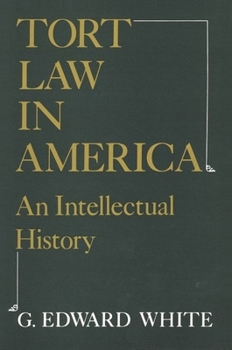Tort Law in America: An Intellectual History
Select Format
Select Condition 
Book Overview
This history of tort law in America looks at how the subject has been conceptualized, pointing out why changes in rules occurred, and who did the changing. White approaches his subject from four perspectives: intellectual history, the sociology of knowledge, the phenomenon of professionalization in the late 19th and 20th centuries in America, and the recurrent concerns of tort law since it became a discrete field.
Format:Paperback
Language:English
ISBN:0195035992
ISBN13:9780195035995
Release Date:February 1985
Publisher:Oxford University Press, USA
Length:300 Pages
Weight:0.65 lbs.
Dimensions:0.6" x 5.4" x 8.0"
Customer Reviews
1 rating
Just what it sounds like
Published by Thriftbooks.com User , 23 years ago
This fine volume is just what its title indicates: an intellectual history of tort law in America.Law scholar G. Edward White begins with the rise of tort law as a separate discipline and traces its development through late nineteenth-century scientism; early twentieth-century legal realism; the contributions of Benjamin Cardozo, William Prosser, and Roger Traynor; and the "neoconceptualism" of the 1970s (the book was published in 1980). In this final chapter, he deals by turns with Richard Posner and Guido Calabresi on the law-and-economics side, and then with George Fletcher and Richard Epstein (the latter before he went over to the utilitarians).White's basic take on this intellectual history is one that is bound to raise a few hackles. Basically, he thinks that tort law itself covers a rather motley assortment of wrongs and cannot be reduced to a few simple principles; most of the ideas that have influenced the history of the field have taken hold, not because they arise from the field itself or because they have so much intrinsic worth, but simply because the scholars at certain influential institutions made them intellectually fashionable. That tort law resists rationalization by simple principles White regards as a good thing, because it keeps legal scholars from becoming a sort of intellectual priesthood.On a second reading, then, one can almost hear White chuckling as he describes Harvard Law School Dean Christopher Columbus Langdell's introduction of the "casebook" approach to legal education (yes, law students, this approach dates only from 1881): Langdell, it seems, thought that not only tort law but _all_ law could be summarized in a few simple principles that the student could extract in good empirical-scientific fashion from a few well-chosen cases. (Even Oliver Wendell Holmes, Jr., disagreed; the entire course of legal history since that time has confirmed that Langdell was wrong and White is right. Why the "casebook" approach is still the centerpiece of law education in the U.S. is therefore not altogether clear.)White is a good writer and he paces all of this quite readably. He is also the author of a number of other books -- including a biography of Earl Warren (for whom White clerked) and a history of baseball -- but I believe this volume was one of his first.Law students will probably find it at least indirectly helpful. We all meet both Cardozo and Prosser early in the first year, and Traynor appears when we get to products liability; I personally liked having White's book on hand in order to place this stuff in its historical context.And it will be of general interest to anyone who doesn't want the law to be handed over to a scholarly class of priests.




